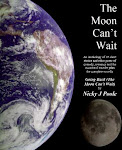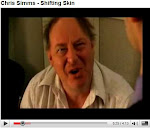(Space colonists fear only one thing)
The stars jabbed out of the blackness of infinity from every direction. They were above and, as above, so below. They were to port as to starboard and ahead as aft. They freckled the face of the endless night and tried to pierce the eyes of the lovers, but the lovers only had eyes for each other.
Albion was looking into Roxette’s eyes with keen adoration as she was telling him the news of the forthcoming grand festival.
"So we are all to congregate in the hanger decks and try to make it as much of a celebration as possible."
"What? Isn’t that a bit… well, tacky, under the circumstances?"
"Don’t you see what my father is trying to do?" said Roxette. "It’s to boost morale after everything that’s happened."
The stars swam dizzyingly all around them outside the Observer Dome as the great craft rotated. It was the only sky that Albion and Roxette had ever seen throughout their lives.
"This was your father’s idea?" said Albion.
"Well – now that the crew of the Argo are joining us on the Prospero for the rest of the mission, he felt as captain that he had to make their arrival into some of occasion. Don’t worry – he’s going to say something about the other crews that… were lost. But he thought if that was all he did everyone would be miserable for another couple of light-years and he didn’t want that. So – we’re having a big bash."
"I should hope he does say something," said Albion. "What happened was tragic."
"I know," said Roxette. "But at least we know we are safe on the Prospero. Our cargo hold door has been double-tested and there’s no flaw. And we found out that the Argo’s door was faulty before it blew, so we do have something to celebrate."
Albion was coming round to Roxette’s view, but he still remained to be completely convinced. "A pity no-one found out before we lost the other two ships," he murmured.
"It’s a pity there was a design fault at all! Just think how lucky we are that, as flagship, the Prospero is built differently."
"That’s true," he shrugged, "otherwise we would have had it. We’re only just reaching half-way."
"My grandfather told me of the festivities they had on Earth when the fleet was launched. I don’t know how they could they have made such a huge mistake."
"We don’t know what Earth was like, come to that. Neither of us have ever been there."
"I wonder what the new world will be like," said Roxette. "That will be something to celebrate for sure."
"Just so long as we get there," said Albion.
"Oh, stop being such a junk-dump!" she said.
The small fleet of four huge spacecraft had set off from the closeting comfort of Earth orbit for their exoplanetary destination two generations ago, the fusion-powered ion drive engines thrusting the ships at a steady acceleration, such that inside the craft, the feeling was exactly like the gravitational pull on the surface of their home planet. Within a year, they were close to the speed of light, though the convoluted warping of space and time, as described by Einstein’s theory of General Relativity, meant that this velocity was only approached but never reached. The one thing that was simple to understand: they would never be going back. Families set out on that stupendous journey, of such stupendous duration, that the parents would age and die, while children would be born and grow to take their place. At least, that had been the mission plan. Half way through their transit to their new home, a second Earth orbiting around the star Tau Ceti, the ships were to turn about face – no problem in the lifeless vacuum of space – and fire their engines forward as brakes, to bring them to a timely halt at their destination.
But not all had gone to plan. Sealed inside the enormous containers, ever to be held with means neither of ingress or egress to the airless void save for inside a full, hard-pressured spacesuit, the fecundity of the travellers had fallen well below expectation. A full complement of passengers was 500, expected to be reached as journey’s end approached. However, not one ship held even a hundred as mid-point neared. Then disaster struck.
The first ship to fall victim was the Mexico. The demise was as sudden as unexpected. A catastrophic failure of the hull, and the one thing feared by any who ever ventured into the void of space befell all on board, the loss of life-giving air to the unfillable vacuum of space. With no time to don pressure suits, death was swift. There were sharp pains, and sudden dizziness, and then profuse bleeding at the pores, with dissolution. Blood was its Avatar and its seal – the redness and the horror of blood. The scarlet stains upon the body and especially upon the face of the victim as the nitrogen in the tissues boiled through the skin, shutting him out from the aid and from the sympathy of his fellow-men. And the whole seizure, progress and termination of the process, were the incidents of half a minute.
At first the survivors on the other three ships, the Prospero, the Argo and the Calypso, thought that the Mexico had been prey to the most extravagant bad luck, a one-in-a-million chance encounter with a primordial chunk of space débris. Then barely had the shock and the grief at the loss begun to subside when the Calypso’s automatic monitoring systems detected that its hull too had been compromised, only this time without the explosive, balloon-like bursting that had laid waste to the Mexico. This time the true fault was identified – the massive hatch to the cargo bay, that would have been opened to unload the myriad items required to colonise and populate a new world, was found to be terminally compromised about its edge, its seal ruptured. Too late – the loss of air so rapid, that all had perished before they could evacuate in shuttle craft or in emergency pressure suits to the two vessels gliding alongside.
Now forewarned, the crew of the Argo, identical in every way to its two sister ships, checked and eventually yet with haste identified a profound error in the construction of its own cargo bay door. Only the Prospero, with a slightly more elaborate and different design, offered refuge. The Argo was abandoned, and all of the remaining colonists joined together on the one sound craft for the final years of their fated journey.
"I presume you will be accompanied by Albion at tonight’s festival?" said Captain Prospero. The ship he commanded was named after his family.
Roxette fidgeted uncomfortably. "Are you sure this festival is the right thing to do, dad? I mean, some people might think it’s a bit in bad taste. Do we all have to go?"
The Captain faced his daughter and studied her gravely. "Yes, everyone. In all the time since I took over as commander of this mission from my father, I have never instructed passengers of this vessel in a more important duty."
"But it seems disrespectful to the dead," said Roxette.
"It is in honour of the dead that we celebrate. In that, and a restatement of the mission. You do understand?"
Roxette Prospero looked levelly at her father. "I suppose so. It’s not as if we have any option."
Captain Prospero frowned. "What do you mean? I’m not going to force you to attend if you would really prefer not to. But it would seem strange to the rest of the crew if my daughter were not there."
"No, dad. I meant: it’s not like we can turn round and get back to Earth. We have to go on."
"Life has to go on. Our life and our future lie ahead of us – something which is true for anyone. I was wondering – have you and Albion ever considered the idea of getting married?"
"Dad!"
"One day you may take over this command. One day when I am too old. It would be beneficent to yourself if you had someone, such as I have your mother, by your side to share in the burden of command, Roxette. Someone such as Albion, for example."
"Oh, dad! Is our whole future planned out for us?"
"The future of all of us," said Captain Prospero, "is in the stars. It has always been so."
"But it is not set, is it, dad? We still do not know what the future is."
Prospero knelt down at his daughter’s side. "My darling daughter, I am determined to make the festival as exciting an occasion as possible. There will be no shortage of stores from which to prepare a banquet. There will be actors playing skits, dancers, comedians, musicians. All these and security inside our spaceship home. Only outside will be the limitless vacuum. But perhaps you can help me."
"In what way?"
"The hangars, where the shuttle craft for planet-fall lie sleeping, offer plenty of room for revelry but are joyless in their appearance. I am thinking of decorating them, each with its own colour-scheme. One is to be blue, lit with blue lights, to suggest the oceans we long to see, the next exotically in purple, the next green, with green illumination to look like inside a jungle, the fourth orange, the fifth white and the sixth violet."
"It sounds a bit gaudy," said Roxette. " Are you sure you’ve an eye for this sort of thing?"
"Well, exactly," he allowed a modest grin. "And I’m sure it’s something that runs in the family. So I was wondering – maybe you could suggest the colour scheme for the last hangar."
Roxette reflected. "How about… black?"
"Black?"
"Yes. Black velvet, like a dreamless sleep."
"That sounds a little… moody."
"No – it will be romantic. Black with red lights, a passionate scarlet, a deep blood colour. So that people who want to get close can do so in an intimate setting, not in a bright glare. That is what you want, isn’t it?"
Captain Prospero was dubious. "Perhaps we could have a big digital clock at one end, with a red display, counting off the time to our arrival at our new home."
"Yes," said Roxette. "After all, you do want us to look forward to raising our children there."
"Perhaps – who knows? – tonight would be good time to announce a forthcoming marriage?"
Roxette regarded her father strangely. "Perhaps."
Everyone was to wear fancy-dress, costumes of their own making. The anticipation that would build in such preparation would heighten the excitement, Prospero thought. No-one was to remain at duties. Prospero alone would man the bridge, watching the festivities from the cameras mounted on the decks.
"All seems to be going well," Albion said to Roxette.
"Things have livened up since the music and dancing began," she replied.
"And since your father suspended restrictions on alcohol. I’ve never seen so much booze. Amazing how quickly people forget."
"Don’t be harsh," said Roxette. "It helps melt their hearts."
He turned to her. "Lucky we don’t need it."
From the bridge, Prospero watched, content that his instructions for a joyful occasion were going to plan. There were to be generous prizes for the most inventive costumes awarded at the height of the evening. It was then that he spotted something on the blue hangar’s monitor that appalled him. Some idiot had thought it would be amusing to come dressed in a pressure suit, the sort that would be worn in an emergency evacuation of a stricken craft. The very suit the kind of which the poor souls of the Mexico and the Calypso had been so grievously unable to don before they were overcome.
Furiously, Prospero hurried down to the blue hangar, but the callous fool in the suit had already left for the orange hangar.
"Master-At-Arms?" Prospero addressed a man dressed as a cowboy.
"Sir?"
"I know you’re not on duty but – somebody has come in a really offensive costume. We need to remove him before he upsets everyone."
"Where is he?"
"There he goes – into the next hangar!"
Prospero called his master-at-arms, though not dressed for duty, to come with him to catch the offensive culprit. The figure passed between other party-goers, all of them falling silent. Captain Prospero and the Master-At-Arms followed but could not catch him as he slipped between the crowds from one hangar to the next. At last, he arrived at the final hangar, with its black fabrics and scarlet illumination. Albion and Roxette were there, hand in hand, watching on.
Prospero strode to the middle of the deck. "Who is that idiot who has come here dressed so distastefully?"
The figure turned slowly to face Prospero. The gold-tinted visor was drawn down on the face-plate of the helmet, the thin film of metal hiding the visage within.
"Master-At-Arms, grab that man."
The Master-At-Arms however, hesitated.
Prospero turned on him. "Unmask that vile interloper!"
"Sir, I…" the master stammered and fell silent.
"Very well," said Prospero, "I shall do it myself!"
He reached forward and snapped back the all-concealing visor.
Instead of someone he recognised, he saw a face, contorted and twisted in a rhesus of agony, fluids bubbling from the bulging eyes, blood sweating from skin and oozing from the nose and mouth, as one dying in the final stage of catastrophic decompression in the vacuum of space.
Prospero fell back, a vaporous shriek wretched out of him as all air was torn from his lungs. He collapsed to the black-clothed deck, dead. Roxette screamed, and threw her arms round Albion, his name dying on her lips. He grabbed at her before he too succumbed. Within scarce a beat, those nearest likewise crumpled as the atmosphere ceased to exist, throats ripping, eyes exploding. On it went like a wave through the whole flux of people inside the spacecraft, and the digital clock stopped and its glowing ember lights went out. And now was acknowledged the presence of the vacuum. It had come like a thief in the night. And darkness and decay and the vacuum held illimitable dominion over all.
The end.
.jpg)




